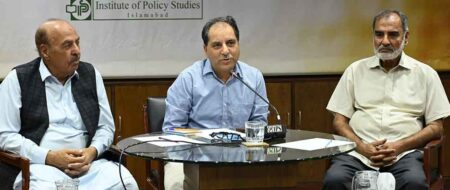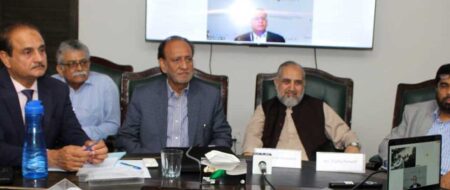Post Budget 2014-15 Review
Budget termed ‘business-as-usual’
According to experts at the seminar titled ‘Post Budget 2014-15 Review’, the budget represented a ‘business-as-usual’ approach with lop-sided priorities and little attention towards key sectors of the economy.
The seminar, which was held at IPS on June 6, 2014, was chaired by Fasihuddin, former chief economist, Planning Commission of Pakistan and addressed by Masud Daher, former federal secretary and ex-chairman, National Tariffs Commission, Mirza Hamid Hasan, former secretary, Ministry of Water and Power, Dr. Shumail Daud, president, Rawalpindi Chamber of Commerce and Industry, Raja Amir Iqbal, ex. president, Rawalpindi Chamber of Commerce and Industry, Air Cdre (R) Khalid Iqbal, IPS associate Tariq Abdul Majeed and DG-IPS Khalid Rahman.
Looking through micro and macro perspectives, the speakers evaluated budget on three parameters i.e. performance of the last year, promises for the next year and the realistic future prospects. The most critical element was the total tax revenue of 3,129 billion rupees, out of which the federal share was mere 2,225 billion with rest transferred to the provinces as per NFC award.
The interest rate, too, has been retained very high but the proposed tax revenues are again very low. The dependence on external resources has gone up as well. The total expenditure of the budget has also increased considerably, yet the allocation for development budget is even less than the previous years.
According to the experts, the budget was made with pro-business approach, whereas the real problems Pakistan was faced with were of fiscal deficit, permanent debt burden and population explosion. It was however hoped that some of the taxation measures, particularly those targeting the informal sector, may turn out to be counter-productive.
It was also pointed that 75 projects announced by the government in areas of energy, water, roads, bridges, tunnels etc., could provide considerable business and employment opportunities if completed.
The attention was also brought to the reduced rate of bank borrowing in the budget. Where this initiative was hoped to address the issue of inflation, it was also feared that this reduction would be done at the cost of much-needed development expenditures, especially in the area of energy.
The speakers indicated dependence on one or two sectors as major shortcoming of the budget, and urged the government to provide more incentives to the SME’s (Small Medium Enterprises). They also identified investment in education sector as essential, terming it a case of emergency.
The exclusion of agriculture and energy sectors from the tax nets was also questioned in the session.
Lamenting that the national productivity and the export quality was declining fast, the speakers advised to invest on the development of skilled manpower as well.
The seminar was concluded in agreement that although Pakistan was faced with numerous problems, the country still is no short of intellectual resource to find the solution. It was however regarded essential to generate ideas and then advocate them proactively for the government’s consideration.












